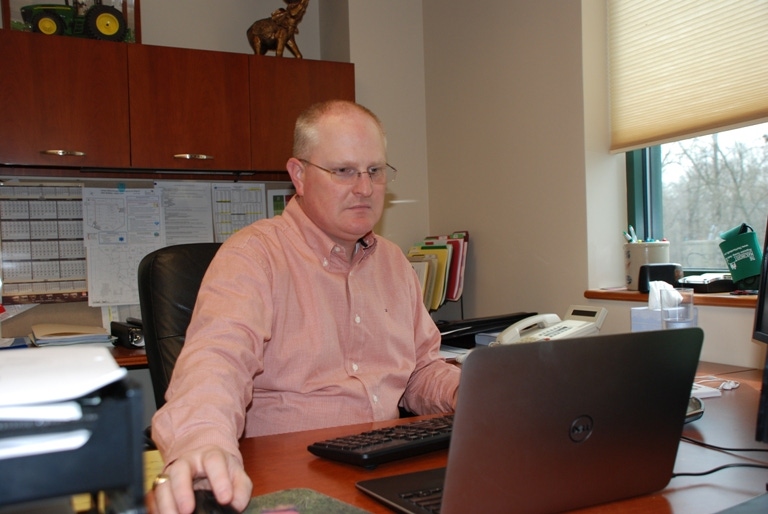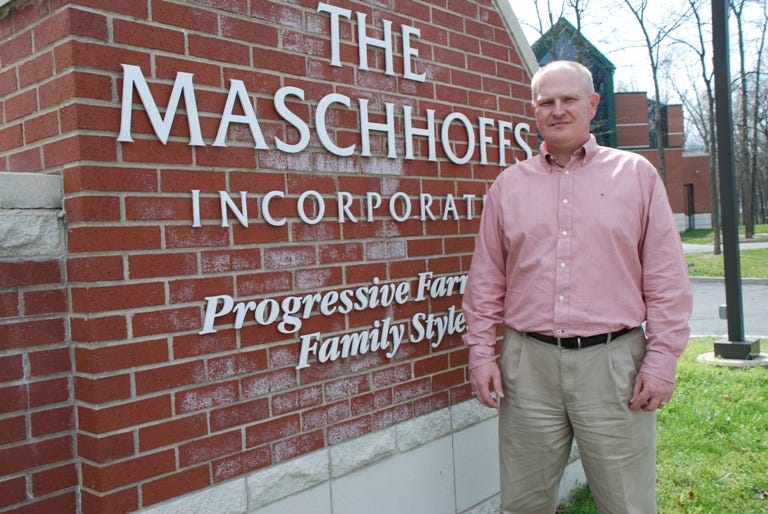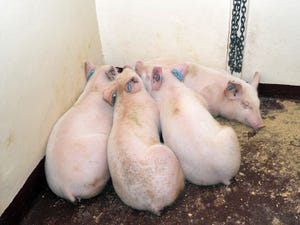2013 Master of the Pork Industry Bradley Wolter
From an early age, this swine enthusiast has been focused on better pig-raising methods.
May 15, 2013

There’s a story shared in the Wolter family about a day when Bradley’s father, while fixing some hog fences, nailed his cloth diapers to a fence post just to keep track of him. Tale or true, the story reinforces Bradley Wolter’s early exposure to pigs and may help explain his lifelong ambition to build better hog production systems.
His real introduction to pig chores came in the early ’80s, when the mounting farm crisis had convinced his grandfather to retire and lease his land to a neighbor. Wolter, his father and a younger brother did, however, keep the pig unit running by caring for the animals after work and school. But a decade later, the relocation of an air conditioning company employing the Wolters’ father from nearby Red Bud, IL, to St. Louis, an hour and a half away, meant the fledgling 40-sow commercial herd would likely be dispersed.
That didn’t fit with young Bradley Wolter’s plan, however. As a freshman in high school, he had justenrolled in the local Future Farmers of America (FFA) program. His goal was to buy the 40-sow herd from his father for his Supervised Agricultural Experience Program (SAEP). “The argument I used was the sow herd would be the basis to pay for my college education,” he remembers.
His father agreed, so the first order of business was to approach the local banker for a modest operating loan. The daily task of carrying 5-gallon buckets of water to a make-do, seven-crate farrowing house was an early incentive for Wolter to begin making plans to “build a better system.” With the bank note in hand, his next stop was to see a neighbor about borrowing a pipe threader so he could install a much-needed automatic watering system.
In those early years, Wolter learned to make do with existing buildings and lots of hard work. “The onus that I put on myself as the older of two boys was to get more out of this farm. I was passionate about those sows and I knew they were the only way I would be able to fund my college education. That’s what grounded me and what continues to fuel my interest in the pig business today,” he reflects. “One of the things I am most proud of is I was the first in my FFA chapter to receive an American FFA degree.”
During his junior year in high school, Wolter ran across an article announcing an Extension Swine Day in nearby Belleville. With permission from his agricultural education teacher, Wolter attended the meeting that would set the course for his college and professional careers.
Extension swine specialist Gilbert Hollis, coordinator of the meeting, spoke on swine nutrition. “I saw how passionate he was and it was then that I thought, ‘This is really the next step for me. I want to go to the University of Illinois and study pig nutrition,’ ” Wolter reflects.
Approaching him with his newfound plans, Hollis suggested that well-known swine nutritionist Bob Easter would be an excellent adviser and mentor for Wolter. He was all set.
College Bound
In the fall of 1993, Wolter packed his car and headed for the University of Illinois campus in Champaign-Urbana. But the plan had changed. Dr. Easter had moved to an administrative position at the university and a new adviser, Mike Ellis from the United Kingdom, was assigned to the new student.
“He had a funny accent and he knew very little about U.S. pig production,” Wolter remembers. But the change of plans turned out to be one of the most fortuitous events in his young life.
“After about five days in college – and having carried 5-gallon buckets of water every day for a decade — I was sitting in my room thinking, this isn’t going to work. I’m not wired for this,” he says.
After explaining his dilemma, he and his newfound advisertook a trip to the university’s research facility, the Moorman Research Farm, which Ellis oversaw. Wolter was soon named student manager of the farm where he kept his hands in pig production and gained responsibility for Ellis’ research populations.
“By the third year, Dr. Ellis had turned me on to graduate school, so he asked me to leave the farm and come up to the lab, where I started doing some research,” Wolter continues.
Résumé Builders
Over the three summer breaks during his undergraduate years, Wolter would add to his experiences and his résumé.
After his freshman year, he took an internship with a local feedmill associated with Continental Grain as a dairy nutritionist. Then, between his sophomore and junior years, Wolter served as an intern for the Illinois Pork Producers Association (IPPA). The IPPA production services director had resigned, giving him an inside track to temporarily fill the staff vacancy.
Like what you’re reading? Subscribe to the National Hog Farmer Weekly Wrap Up newsletter and get the latest news delivered right to your inbox every Friday!
“That role put me in contact with staff at the National Pork Producers Council (NPPC),” he explains. More importantly, he crossed paths with Al Tank, who convinced him to spend the summer between his junior and senior years in the NPPC’s Washington, D.C., headquarters working on environmental programs.
“Life’s often about being in the right place at the right time,” he acknowledges. “During my summer internship and later as a consultant for NPPC, I worked on the ‘Environmental Dialog on Pork Production.’ Basically, it built the thesis for the technologies the pork industry had employed to reduce the environmental footprint. It was part of the message the pork industry brought to the dialog with the Environmental Protection Agency (EPA).”
Entering his senior year at Illinois, Tank began recruiting Wolter to fill the NPPC’s director of environmental services position in Des Moines, IA. But Ellis urged him to consider graduate school.
The ‘Butterfly Syndrome’
“The NPPC experience allowed me to interact with large-scale pork production systems and compare them with our systems in the Midwest,” Wolter relates. “My interest was always about how we could apply a business model from the larger systems, yet retain the biological animal husbandry model that I grew up with. It was that experience that led me back to grad school. I could see the opportunity to build a better system in the Midwest where, in my opinion, pigs should be produced because of the resources there,” he explains.
Wolter describes his first year of graduate school as resembling the flight of a butterfly — all over the place.
“I wanted to learn it all – nutrition, housing design, environmental management, genetics – because my interest was about the system,” he continues.
Fortunately, world-renowned animal behaviorist Stan Curtis came along at just the right time, serving as a co-adviser and helping Wolter gain some focus.
During that time frame, prominent pork producers George Brauer, Joe Connor, DVM, and the Maschhoff family were driving forward “in grand fashion” with a wean-to-finish model.
“The place you start is with facility design and infrastructure,” Wolter explains. His master’s program was now focused on group size, floor space allocation and feeder design and location within the pen.
“Dr. Curtis’ hypothesis was that there was a social dynamic in the large groups of weanling pigs that could be overcome by feeder placement,” he notes.
The university facilities were not big enough for large group experiments, so Wolter and Curtis took a road trip east to Indiana-based JBS United to see fellow Illini graduate and swine nutritionist Doug Webel. With help and encouragement from Ellis and Curtis, Wolter began laying out large-group-size experiments to try to better understand the impact of floor space on pig performance. “This subsequently led to how we position feeders to try to overcome what we determined was postweaning drag due to large group size,” he notes.
Armed with his biological work, Wolter headed across the street at U of I to Mumford Hall, where agricultural economist Gary Schnitkey helped develop an economic model to track the returns of the various pen designs.
“Because my passion was all about building a better system, the biological response is an intermediate step. My interest didn’t stop there,” he continues. “I felt I had to move beyond the biology and into the economics, because that is what really equates to a sustainable system. An unprofitable system is not sustainable.”
PhD Reset
Unwavering from his goal to build a better, more efficient production system for the Midwest, Wolter focused on pig growth in his PhD work. The nine chapters of his thesis, all within different disciplines (nutrition, housing design, genetic variation, etc.) focused on the bottom line.
“My thesis demonstrated that the pig is incredibly resilient and has the innate ability to deposit lean tissue. How you grow the pig can lead to different levels of efficiency. If its growth is impeded, the pig has the ability to compensate — assuming there are no health challenges or other insults — and that compensatory growth can be very efficient,” he stresses.
Therein lay the challenge — leveraging the biological fact that pigs can be managed for more efficient compensatory growth — but there are risks. “You have to understand that with attempts to manage compensatory growth comes risk, especially if the health status of the population changes,” he points out. “At the end of their growth curve, pigs overeat and deposit a lot of fat, particularly in some genotypes.”
For example, the use of floor spacecan be modified to create a mild stress on the animal, thus curbing its appetite. When the stressor is removed, the pig will compensate in terms of lean protein growth, which is a more efficient growth, and the net result is the pig deposits less fat and more efficient lean. “Not more lean, but the lean that is deposited is more efficient to produce,” he explains. “By applying that piece of biology along its growth curve, when resources are most costly, you may want to leverage them more.”
Joining The Maschhoffs
Wolter has always been passionate about applying what he has learned at the systems level. Ken Maschhoff was the first to volunteer facilities for field trials tracking the impact of group size on growth curves.
As they grew more and more comfortable with their working relationship, Wolter began considering his postdoctorate options. Likewise, Ken Maschhoff began asking him about his career plans and invited him to join their enterprise. Wolter drafted his own job description and after a visit with the rest of the Maschhoff family, they struck a gentlemen’s agreement — Wolter would commit to what the business needed if Maschhoff would commit to ensuring that research facilities would be available.

“The challenge has always been, how do we measure pig performance in a practical way? It’s difficult because it’s a biological system, and the nature of the business makes it difficult to measure. Dr. Ellis taught me that you have to objectively measure the system you are trying to improve or you will be misled in the improvement process,” he relates.
Two Growth Options
There are two ways to grow a pork production business — organically or through acquisition. Acquisitions not only bring different systems and management styles, they often involve different genetics, nutrition programs, facilities, etc.
“As a pure scientist, when I looked at the systems we’ve acquired, they have not been the ideal, but they provided the opportunity to apply our principles — systems-based methodology — to make them more efficient. The downside is the differences create significant levels of complexity; it affects how nimble you can be,” he notes.
“The core principle that we protect at all costs is systems-based biology, applying it, with the measurement being economic outcome. Because the pig is so resilient and so adaptable, the principles apply.”
But the systems sometimes respond to these principles better than to others, he admits. “The opportunity we have is to learn from that and perfect the model,” he adds.
One lesson he has learned is that “you always underestimate the time it will take to phase in those principles. The constraint is leadership and the investment you continue to make in human resources. New skills and competencies are discovered with each acquisition,” he says.
Human Capital
Wolter, now chief operating officer at The Maschhoffs Inc., serves as an adjunct faculty member at the University of Illinois, serves on masters’and PhD committees, lectures at a few classes, and serves on advisory panels for the animal science department and the college. In 2012, he was awarded the Outstanding Young Alumni Award.
He is a firm believer in facilitating interaction between students and management teams at the farm level. “We measure all of the variables you can quantify, but what we are missing in building this biological system is the real constraint — people. Often, students placed in a position to lead are ill-equipped. My deep passion and what fuels my deep commitment to collaborate with the University of Illinois is to bring those students into our business and to invest in their development in that context,” he explains.
“The fundamental shift that makes it more important than ever before is the scaling of the industry. As our industry scales up, it is important to understand some of the constraints that it will face. Leadership of teams is one of those constraints,” he notes. “This industry is largely about individual contributors that made a pig farm work. As this industry consolidates and scales to meet a global demand for pork, the constraint is not at the animal husbandry level, it’s at the leadership level.”
As he collaborates with his mentor, Mike Ellis, a goal is to identify the top talent. “When managing an animal production system — the meat product is the centerpiece of the model, then focusing on the principles of genetics, health, housing and nutrition — and leveraging those biological disciplines to better understand three main functions of the biology of pork production: reproduction, growth and carcass conversion,” he relates.
Mentorship
Wolter credits Ellis and Curtis for much of his professional growth: “They helped a young man from southern Illinois with zero perspective and helped him see the opportunities, then provided the encouragement to go after those opportunities,” he says.
He also recognizes Jason Logsdon, his college roommate, who chose investment banking over graduate school. “We had very different but complimentary skill sets, similar core values and a passion for Midwest pork production,” Wolter explains. “When TheMaschhoffs needed financial skills, we brought Jason in. To have a peer that pushes you in a positive way, someone you can help build a business with, is a rare opportunity. I am a fundamental believer that more minds get to a better solution than a single mind. That’s how I would describe our relationship.”
Passion for Pigs
Firing Wolter’s passion for pigs is his core belief that “it is a noble profession to care for these animals and build a more efficient system. As I view the world, I see this tremendous demand for pork. The challenge is, what is the system that will meet that demand and at an acceptable level of efficiency? I am passionate about building the system that can succeed at that level. As long as this system continues to succeed and meet its objective — profitable pork production — we will continue to expand and scale the system in accordance with that signal. We won’t grow for growth’s sake. We’ll grow when there is demand for what we do,” he explains.
When Wolter meets students with similar drive, he offers this sage advice: “Prepare for sweat equity if you want success.Secondly, and independent of whether you pursue systems biology or whatever in life, pick your mentors very wisely. Look for mentors that have the core values that match yours, and who have a skill set that matches your interests,” he says.
“Philosophically, my parents’ objective was to make the next generation better. That’s very much how I think about leadership and building a business,” Wolter continues. “My job is to be resourceful with the gifts this business has been given, but the primary gift is the next generation of human talent. I learned a lot from my business decisions at an early age — probably more from mistakes than successes.”
You might also like:
2013 Master of the Pork Industry Malcolm DeKryger
2013 Master of the Pork Industry Bob Thaler
2013 Master of the Pork Industry Jim Meimann
You May Also Like



